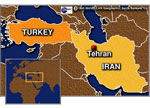 Reuters: The U.S. Commerce Department on Monday issued a rare emergency order aimed at blocking the illegal re-export of two large, used U.S.-built commercial jet engines to Iran by a company based in Turkey.
Reuters: The U.S. Commerce Department on Monday issued a rare emergency order aimed at blocking the illegal re-export of two large, used U.S.-built commercial jet engines to Iran by a company based in Turkey.
By Andrea Shalal-Esa

WASHINGTON (Reuters) – The U.S. Commerce Department on Monday issued a rare emergency order aimed at blocking the illegal re-export of two large, used U.S.-built commercial jet engines to Iran by a company based in Turkey.
Assistant Commerce Secretary David Mills, who oversees export enforcement, signed the order on Friday after learning that Turkish-based 3K Aviation Consulting & Logistics planned to re-export two engines built by General Electric Co to Iran on Tuesday using Pouya Airline, an Iranian cargo airline.
There has been a warming in U.S.-Iranian ties this year, including a November 24 deal to curb the Iranian nuclear program, but most exports to Iran remain strictly banned under U.S. law.
The order, which will be in effect for 180 days, includes sweeping consequences for 3K Aviation, Pouya Airline and Adaero International Trade, the Illinois-based company that the department said had shipped the used aircraft engines to Turkey.
The order bans all three companies and their key officers from engaging in negotiations, trade, transport or other activities involving any U.S. export-controlled items, not just the aircraft engines in question.
The order also applies to banks, insurance companies and other parties that might be involved in financing or otherwise supporting any such transactions.
The department issues one or two such orders a year, said one Commerce Department official.
Sadettin Ilgin, managing director of Adaero International, denied any wrongdoing, and said he had been in touch with U.S. and Turkish authorities to clear his company’s name.
Ilgin told Reuters the company had documentation showing that it sold the engines, which came from Turkish Airlines, to International Aerospace Group, a U.S.-based company, for $4.1 million, and then shipped them from Istanbul, Turkey, to Frankfurt, Germany, in late December.
He said he had expected the engines to be sent to Russia for use by Siberian Air and was shocked when he received the U.S. order aimed at blocking their transfer to Iran.
“We did not sell the engines to 3K,” said Ilgin, who worked for Turkish Airlines for 40 years. “This was all done properly and we have the paperwork to show it.”
Ilgin said Turkish officials had assured him that they had denied permission for Pouya Airline to pick up the engines in Antalya, southwestern Turkey. Officials at 3K told him they planned to send the engines back to Germany, he told Reuters.
No comment was immediately available from 3k Aviation or from International Aerospace Group.
A Commerce Department official declined comment on whether Turkey was cooperating with the U.S. government on the issue and how the department had learned about the planned transfer.
GE spokesman Rick Kennedy said the company had not been informed about the Commerce Department order. The engines in question were used and GE was not involved in their sale.
It was not immediately clear what type of engines might have been involved in any previous transport by Pouya.
The Commerce Department official declined comment on whether the U.S. government was investigating possible earlier illegal exports of U.S.-built engines to Iran by 3K Aviation.
In the order, the Commerce Department said it could issue a temporary export ban if a violation of U.S. law appeared imminent, as in this case.
In signing the order, Mills said the department’s Bureau of Industry and Security had presented evidence that two GE CF6 engines were transported to 3K Aviation in Turkey on behalf of Adaero International and that 3K planned to send the engines to Iran using Pouya Airline on January 7.
Two sources familiar with the aircraft engine market said the engines were likely intended for use on Airbus planes operated by Iran.
Previous cases have led to criminal and civil charges against companies that re-exported goods to Iran.
(Reporting by Andrea Shalal-Esa; editing by Ros Krasny and Leslie Adler)


